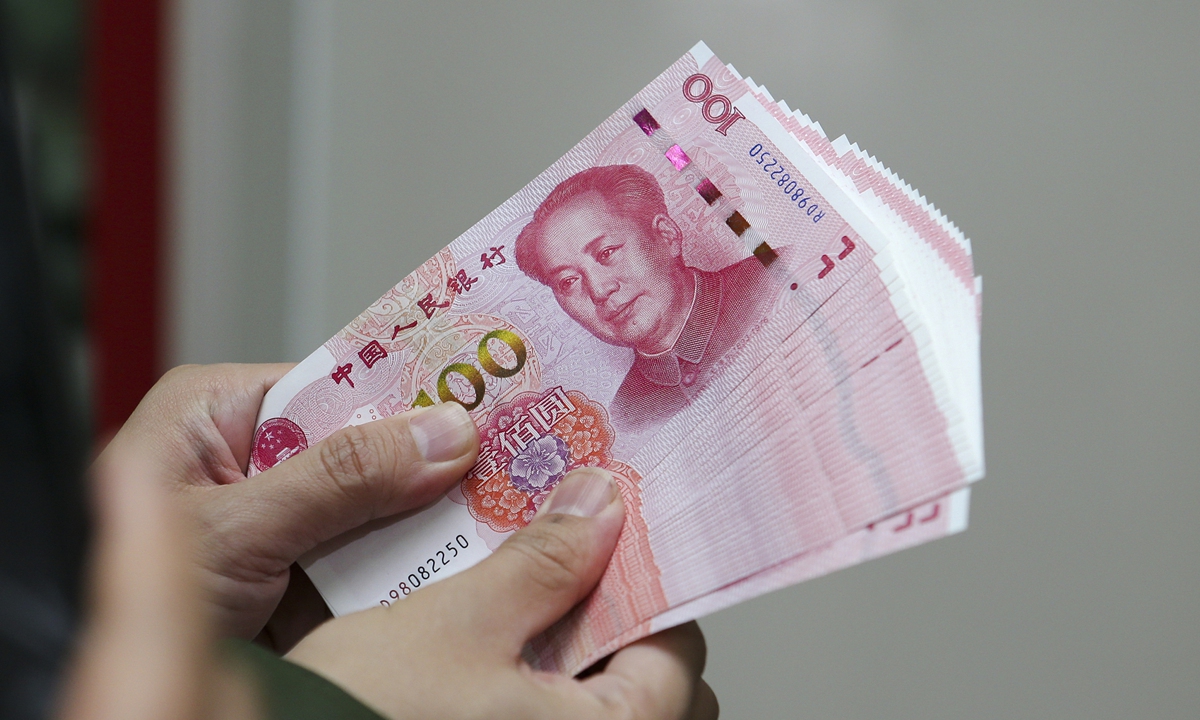
Chinese yuan Photo:VCG
Foreign investment in domestic stocks has been showing an overall positive trend. In the first half of the year, foreign investors increased their net holdings of domestic stocks and funds by $10.1 billion, reversing the net reduction trend of the previous two years. Notably, in May and June, the net increase in holdings reached $18.8 billion, indicating a stronger willingness of global capital to increase allocations to the domestic stock market, Jia Ning, an official of the State Administration of Foreign Exchange (SAFE), told a press conference on Tuesday.
Jia noted that this year, foreign investment in yuan assets has generally remained stable. Foreign holdings of domestic yuan bonds now exceed $600 billion, a record high.
We assess that foreign investment in yuan assets will continue to have relatively stable and sustainable growth potential. Foreign investors hold approximately 3 to 4 percent of domestic bonds and stocks in terms of market value. Supported by multiple positive factors, it is expected that foreign investors will gradually increase their allocations to yuan assets, the official noted.
A robust economic foundation has created a stable macroeconomic environment for foreign investment in China, Jia said. As the effects of policies to expand domestic demand become evident, the trend of steady and positive economic growth is expected to further solidify. Recently, several international investment banks have expressed optimism about China’s development opportunities, upgrading the rating of Chinese assets from neutral to overweight.
In addition, the high-quality development of the financial market has created a favorable policy environment for foreign investment in China. China has continuously improved the interconnectivity mechanisms of financial markets, expanded investment channels and optimized the investment environment, making it significantly more convenient for foreign investors to participate in China’s financial markets, Jia noted.
At the same time, the country has established a comprehensive and deep financial market system, with the market value of both bonds and stocks ranking second globally. The financial products are diverse and highly liquid, providing foreign investors with a wide range of options for allocating yuan assets.
Global demand for diversified asset allocation has also created favorable development opportunities for foreign investment in China. In recent years, volatility in international financial markets has increased, and investors generally believe that more diversified and decentralized asset allocation is needed globally. With a stable yuan value and relatively independent return performance on a global scale, yuan assets have become an important choice for global investors to diversify risks and a key allocation target for enhancing returns, according to Jia.
A recent survey by the Official Monetary and Financial Institutions Forum of 75 global central banks showed that 30 percent of central banks plan to increase their allocation to yuan assets, Jia noted.
“Chinese assets have demonstrated stronger growth potential, Chinese companies have shown robust innovation, and the relatively reasonable valuation levels of Chinese assets have triggered enthusiasm from foreign investors,” Pan Helin, a member of the Expert Committee for the Information and Communication Economy under the Ministry of Industry and Information Technology, told the Global Times on Tuesday.
Pan noted that earlier this year, China’s DeepSeek stunned overseas markets, as a milestone that highlighted the innovative capabilities of Chinese companies. Companies with strong innovation power often have significant potential for performance growth, which is highly attractive to foreign investors.
“In the second half of the year, foreign investors’ enthusiasm for Chinese assets is expected to continue, primarily focusing on sectors such as new consumption, new pharmaceuticals, and new technology, like autonomous driving, chip manufacturing, and new energy,” the expert said.



